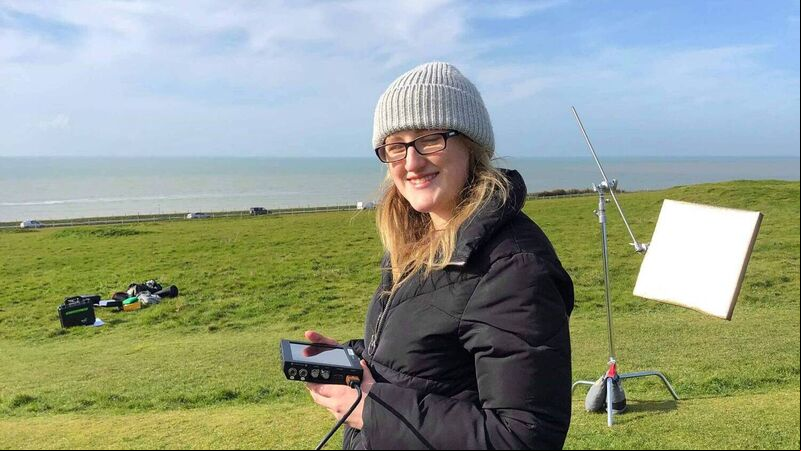Capturing a Cork community’s fight on film

Zoë Fitzpatrick.
ON Zoë Fitzpatrick’s fourth birthday, her grandad pointed out a news article to her mum.
It was a moment the Fitzpatricks may have come to regret at points over the past two decades: it was an article about plans for a hazardous waste incinerator in Cork Harbour, and it was the start of a chain of events that would see Linda Fitzpatrick involved in a central role in the longest running environmental protest campaign in the history of the state.

Cork Harbour Alliance for a Safe Environment (CHASE) was formed at a meeting soon after, and Zoë’s mum became press officer for the campaign group, largely made up of Cork harbour communities, that have fought plans by incinerator company Indaver to build a 240,000 tonne incinerator in Ringaskiddy ever since.
Zoë, now 24 and a young filmmaker and graduate of St John’s College of Further Education, has had her short film on the environmental struggle that formed the backdrop of her childhood selected for the Toronto International Women’s Film Festival.
A Community, Fighting is Zoë’s short docu-poem, using footage shot over 20 years of oral hearings, High Court appearances, protests and fundraisers, with a powerfully emotive voiceover written by Zoë and performed by Cork actress Megan Haley.
“It kind of came to me as a fully-formed idea,” Zoë says.
“I was watching this short film in a similar style and I thought, ‘Oh my God, I could do that with the CHASE footage’. That same day, I wrote the voiceover, which came to me in about two sittings, and then it was a question of collecting all the footage and seeing what was there, and stepping back and looking at it from a filmmaker’s perspective.”
One of the strangest aspects of sitting down to watch all the archive footage was that, quite often, she was seeing herself as a child in it.
“It was like dusting off the cobwebs, but it was also looking at it with a perspective I obviously didn’t have at the time.”
“There is early footage of protests and marches, and footage of Cork Harbour people, but also clips of the people who are no longer with us, which is amazing too because I them: I the nice lady who brought sweets to my house when she came to talk to my mum.”
Zoë deliberately tried to visually introduce the idea of repetition into her film, because she says that reflects the lived experience of the protestors, who have endured three successive planning applications by the same company on the same site.

This repetition fuels one of CHASE’s long-standing complaints: that the planning process is biased against the private individual and in favour of large corporations with deep pockets, who can afford to keep coming back again and again.
At one of CHASE’s three Bord Pleanala oral hearings, the point was raised that attendees sitting on one side of the room were being paid for their presence, while attendees on the other side were actually missing days of paid work to contribute.
It’s an inequity that Zoë is keenly aware of, because she’s seen the impacts on those around her.
“I’ve seen my mum drop everything to try to write a press release because there’s suddenly been an announcement, and she’s supposed to be packing for a holiday that’s been planned for months.
“There are stories of people whose children have been sick, who have been at the doctor’s and trying to read documents in the waiting room. There’s a general sense of, ‘would you ever go away and let us live our lives?’ What does it take, what will make it actually go away? When you’re fighting deep pockets, nothing has proven to work so far. There are whole communities involved where you can’t drive through one of those villages and find a single person who wants it. The word is out there: what does it take for it to be heard?”
CHASE may feel partly vindicated by their most recent round in the High Court: in March this year, Mr Justice David Barniville ruled that CHASE was entitled to succeed on two of its 11 grounds of challenge to planning permission granted by An Bord Pleanala in May, 2018.
Not only this, but one of the grounds on which Judge Barniville found in favour of CHASE was that of “objective bias”, that a member of An Bord Pleanála had previously worked for a firm of consultants employed by Indaver on waste policy.

Another court date has been set: on June 8, the judge will decide whether to quash the application, or whether to allow Indaver to take their application back to An Bord Pleanála again.
Has Zoë’s life-long connection to this unfolding saga influenced her sense of justice, or any scepticism she might have about how our public institutions work?
“You have to understand that when I was young, it was normal,” she says.
“And it got crazier and crazier: you think, could they really make this decision? And then they do. After the amount that this community has demonstrated its opposition, and it gets ruled the other way, and you’re just, like... ‘how?’ It would definitely made me question who is making those decisions and why.”
Zoë’s environmental docu-poem is something of a change of direction for her: following two years studying film in St John’s and a further year at the University of Brighton, she was predominantly interested in making short dramas and music videos, and was doing some corporate work too.
But, during the year of lockdowns and restrictions that was 2020, A Community, Fighting gave her a project she could work on alone, mostly editing pre-existing archive material and working on developing new skills in areas like sound design.
Released in January via social media channels, the film has garnered an “overwhelming” response, she says. Now, it can reach an international audience: it has been selected for both Toronto International Women’s Film Festival and a Best Shorts International Competition.
“I definitely think that the internet lets you access the space that you need to get your voice heard,” she says. “There’s a film festival for basically every niche now. My film will be in the environmental category at the Toronto festival. It’s good to know there are people out there watching.”
A Community, Fighting by Zoë Fitzpatrick can be watched at:
https://www.facebook.com/watch/?v=1123545284829058







 App?
App?


